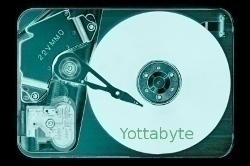Yottabyte
A yottabyte is an amount of information that equals one septillion bytes or one quadrillion gigabytes. This amount can also be measured as 1024 bytes. Yottabytes should not be confused with the term “yobibyte,” which is used to express a measurement that is much larger. Although yottabytes are currently an imaginary measurement, servers or even personal hard drives may use them some day.
What Uses Yottabytes?
Currently, no device in the world uses yottabytes. In fact, all of the combined storage space on every hard drive in the world would not even amount to one yottabyte. As of 2006, the combined storage space of every hard drive in the world was estimated to be 160 exabytes, which does not even amount to one zettabyte, the next lowest measurement below a yottabyte. As of 2009, the entire Internet was estimated to contain 500 exabytes or half of one zettabyte of information. However, at the current rate of exponential hard drive growth, the total storage capacity in the world is sure to reach one yottabyte within the next 10 years.
How Yottabytes Would be Stored
Although yottabytes may be considered a real measurement in the near future, it would still take nearly every hard drive, server, and digital storage device in the world to accumulate such a vast amount of information. However, there are hard drives currently in existence that are commonly available and are capable of storing terabytes and even petabytes. Therefore, the next logical hard drive expansion would be capable of storing exabytes and even zettabytes. Within the next few decades, it is very possible that common computer users will have hard drives that are capable of storing yottabytes of information at one time.


Comments - No Responses to “Yottabyte”
Sorry but comments are closed at this time.